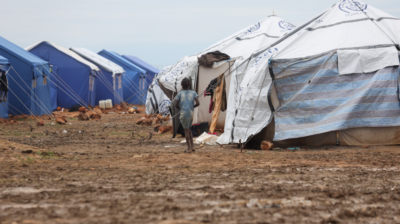Trump’s Sudan snub: Are we better off without him?
Donald Trump is trying to build an image as a mediator of peace, but the new Trump administration signals no interest in Sudan. Is Sudan better off without him? And can what’s left of the Troika that once contributed to negotiating peace in Sudan step in?
When Trump won the US presidential elections in November 2024, Sudanese political analysts were debating what the implications would be for Sudan. Social media platforms drown in fear: 'Trump will abandon Sudan for his regional allies. From now on, Saudi Arabia, the UAE, and Egypt will be the only countries that can depend on any sort of working relationship with the US’. One can understand the fear. These regional US allies have all been involved in the war in Sudan in one way or the other, with the UAE allegedly supporting the Rapid Support Forces (RSF), and Egypt backing the Sudan Armed Forces (SAF). At the moment, President Trump seems to have only three issues on his mind: Internal US politics, the war in Gaza, and the war between Russia and Ukraine.
During his first term as president, Trump showed some interest in Sudan, but only in relation to normalization with Israel. So far in his second term, he has not even mentioned Sudan. A couple of his top aides have briefly spoken about Sudan though: Secretary of State Marco Rubio and US ambassador to the UN Dorothy Shea both addressed Sudan during their congressional confirmation hearing although just in passing and without outlining any concrete plans beyond mentioning the country. The fact that the Trump administration has not appointed a special envoy to replace Tom Perriello is an indication that Sudan is not in the list of Trump’s priorities.
To better understand Trump’s potential policy on Sudan, it is important to look at what his predecessor, Joe Biden, did in addressing the conflict in Sudan, and before that, US policy on Sudan in a historical perspective.
Not a priority
Since 2002, six US Special Envoys have dealt with Sudan. The last US special envoy, Tom Perriello, served in the Biden administration. While Perriello was part of the US delegation at the Jeddah Platform, his approach was ineffective, and he did not target the groups that could have contributed to substantive change. The talks in Jeddah focused on a narrow set of objectives – to facilitate the delivery of humanitarian assistance, establish ceasefires and other confidence-building measures, and build toward a permanent cessation of hostilities. Perriello, being a junior official, may not have had the clout to report to the Secretary of State; another signal that the US did not take the situation in Sudan seriously.
The US did have a deeper engagement with Sudan prior to the last assignment of the special envoys. In its engagement with the second civil war in Sudan (1983-2005), the US government operated at times solo and at others through the Troika, a trilateral body that included, in addition to the US, the UK and Norway. The Troika played a key role in the negotiations that led to the comprehensive peace agreement, (CPA) in 2005. The Troika continued its engagement and was present during the Juba peace talks which eventually led to the Juba Peace Agreement in October 2020. It was still involved during the tumultuous transition in Sudan but disappeared after war broke out in April 2023. With the establishment of the Jeddah platform, the UK and Norway were not visible like they were during the days when the Troika was active. It seems that the US was the driving force of the Troika. Will the UK and Norway step up?
Hit hard by the USAID shut down
Despite the rather non-coherent US policy on Sudan, the country receives substantial funds from US donor institutions, particularly USAID. The United States is the largest donor of humanitarian aid to the Sudan response, providing more than $2.3 billion in humanitarian assistance since the start of fiscal year 2023. USAID has a long history of presence in Sudan. It started its support for Sudan in 1958 during the first military dictatorship of General Ibrahim Abboud. During the drought of 1984/85, the visit of Vice President George W Bush to Sudan in 1984 was followed by massive relief operations made possible by the USAID.
Funding for humanitarian needs became even more important after the April 2023 war. In April 2024, a donor conference was organized in Paris. The conference pledged $2.2 billion. The US pledged $162 million. Later in 2024 (in September and December), the US announced an additional $624 million, out of this, $276 million came from USAID. Trump’s executive order on January 20 freezing foreign assistance, forcing American-funded aid and development programs worldwide to shut down and lay off staff, represents a serious blow to humanitarian work in Sudan. Across Sudan’s capital, Khartoum, 742 kitchens serving around 816,000 people have closed. These kitchens were also used by the Emergency Response Rooms (ERR) which are now one of the very few providers of life-saving services in the war affected areas. Trump’s decision to slay USAID came at the worst possible time for Sudan. The freeze might be temporal and can be lifted, but until that time, funding is urgently needed for the Emergency Response Rooms to continue serving local communities.
The Troika is dead. Long live the duo?
The US’ policy on Sudan has been incoherent: Whilst being one of the biggest donors, the US simultaneously imposed sanctions on Sudan. These sanctions that were imposed by President Clinton in 1993 were lifted, ironically by Trump, in 2017. The US’ ambivalent policy towards Sudan has long crippled the Troika from constructive engagement with Sudan. Apart from an attempt by the UK to get a UN resolution on Sudan through in November 2024 (an attempt that was vetoed by Russia), the Troika has been pretty much invisible for the past few years. Norway, the third Troika member is providing substantial humanitarian assistance to Sudan through the Norwegian Refugee Council and Norwegian Church Aid, but seems to be reluctant to stick its neck out politically when it comes to the war in Sudan.
It’s hard to imagine that anything good can come out of the US’ lack of interest in Sudan. It’s also hard to argue against any commentators who predict that the US will abandon Sudan for its allies in the region. Neither Saudi Arabia, the UAE or Egypt is on the same page when it comes to dealing with the disastrous war in Sudan. While Saudi Arabia’s position on Sudan is ambiguous, the UAE and Egypt have chosen sides.
With the US seemingly out of the game, what’s left of the troika should up their stakes. Given Trump’s lack of engagement, Norway and the UK should step in and attempt to push the warring parties into negotiations.
This Sudanese Perspectives blog post is written by Munzoul Assal, Senior Researcher at CMI.
The views expressed in this post are those of the author, and do not necessarily reflect the opinions of the SNAC project or CMI.






